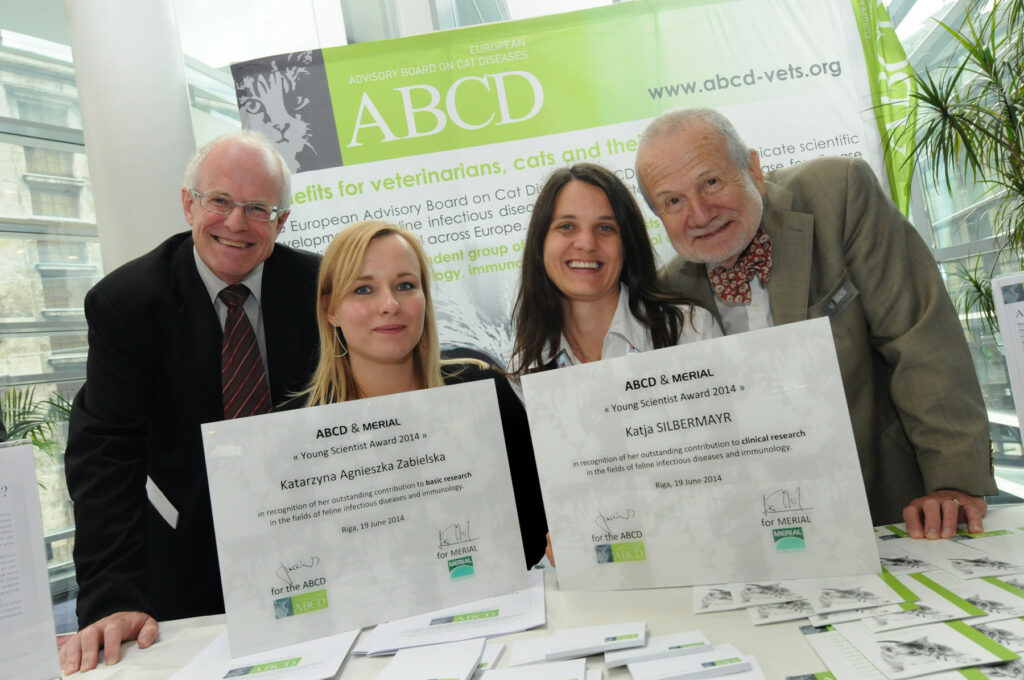
Two ABCD & Merial Young Scientist Awards (AMYSA) were presented this year, for Basic research and for Clinical research. The award ceremonies took place on the 19th of June in Riga (Latvia), at the occasion of the congress of the International Society of Feline Medicine, organised by International Cat Care.
Katarzyna Zabielska: developing tools against injection site sarcoma
The 2014 AMYSA for Basic Research was presented to Katarzyna Agnieszka Zabielska, assistant professor at the department of small animal diseases at the Warsaw University of Life Sciences, for her work on the effect of biocomplex of colloid gold nanoparticles with doxorubicin on feline injection-site fibrosarcoma (FISS). She was also the first to grow feline fibrosarcoma cell lines on chick embryo chorio-allantoic membrane. Treatment of FISS is a challenge for practitioners. The effectiveness of the most commonly used cytostatic drugs against FISS, doxorubicin, is debatable while it also has many side effects. By associating it with colloid gold nanoparticles, its effectiveness may be enhanced. "Developing a FISS cell line and studying the anti-FISS effects of gold/doxorubicin complexes may all sound very far from veterinary needs, commented professor Marian C. Horzinek, chairman of the European Advisory Board on Cats Diseases (ABCD). “However, Katarzyna convinced the audience that her findings can be effectively used as a preclinical model in feline oncology."
Katja Silbermayr: non-invasive detection of Demodex mites
The 2014 AMYSA for Clinical Research went to Katja Silbermayr, from the Institute of Parasitology at the University of Veterinary Medicine in Vienna (Austria), for her work on developing a non-invasive and specific test for feline demodicosis. “Katja Silbermayr has developed a very valuable tool for detecting and discriminating feline Demodex mites from faecal samples, which will be of great help for practitioners”, commented Dr Jean-Christophe Thibault, Merial’s Technical Director for Biologicals (Europe, Middle East and Africa). “Especially when considering that treatment of Demodex infections can be long-lasting, this non-invasive detection method may be used to assess treatment success more easily and to monitor patients on a long-term basis”.
ABCD & Merial Young Scientist Awards
The ABCD and Merial Young Scientist Award, created in 2008, is funded by Merial and is presented to young scientists in veterinary or biomedical sciences, who have made an original contribution in the field of feline infectious diseases and/or immunology – “although we are relatively open-minded on the topic”, added Jean-Christophe Thibault. This year, both award-winning topics “were slightly outside the scope of viruses and bacteria. But most importantly, they were dedicated to the overall progress in feline health and welfare”.
Applicants should have published their findings in a journal listed in PubMed or Web of Science or have had them accepted by another recognised assessing body. Candidates should be based in Europe, have completed a veterinary or biomedical curriculum, and be under 35 years of age at the time of application. Applications in the fields of both basic and applied sciences are welcome.
For further information, please contact Karin de Lange, ABCD secretary, karin.delange@abcd-vets.org
Notes to Editors:
Photo attached (credit: ©iCatCare). Caption ABCD & Merial Young Scientist Award winners Katarzyna Zabielska (second left) and Katja Silbermayr flanked by Jean-Christophe Thibault (Merial) and professor Marian Horzinek (ABCD).
The European Advisory Board on Cat Diseases (ABCD) is an independent panel of 17 leading veterinarians from eleven European countries, with an expertise in immunology, vaccinology and/or feline medicine. The ABCD was set up to compile guidelines for the prevention and management of major feline infectious diseases in Europe, based on current scientific knowledge. For more information, please visit www.abcd-vets.org.
Merial is a world-leading, innovation-driven animal health company, providing a comprehensive range of products to enhance the health, well-being and performance of a wide range of animals. Merial employs approximately 6,000 people and operates in more than 150 countries worldwide. Its 2013 sales were $2 billion. Merial is a Sanofi company. For more information, please see http://www.merial.com.